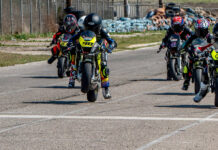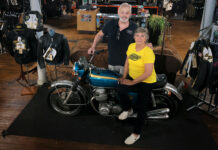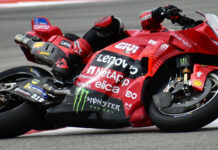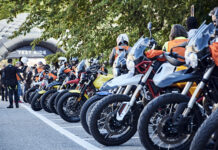In a private meeting held last Thursday at Barber Motorsports Park, Daytona Motorsports Group’s Roger Edmondson presented his 2009 plans for AMA Pro Road Racing to a group of representatives from the Japanese motorcycle manufacturers that currently participate in the AMA Superbike series. Following the meeting, Edmondson shared those plans with interested media outlets, including Roadracingworld.com . According to DMG’s presentation, there will be four classes of racing in 2009: Daytona Superbike, LiterBike, MOTO-ST and a specialty racing series–the Red Bull AMA U.S. Rookies Cup was given as an example (although no agreement is in place for 2009) but the proposed 450cc Super Singles class or a Kawasaki Ninja 250 spec race were also mentioned as possibilities. Daytona Superbike will be the premier class and will race twice on a typical three-day weekend, once on Saturday and once on Sunday. It will have a rule structure designed to “promote parity and competition” among Twins, Triples and four-cylinder machines, allowing participation from the maximum number of brands from around the world. DMG’s presentation states that 10 manufacturers (Aprilia, BMW, Buell, Ducati, Honda, Kawasaki, KTM, Suzuki, Triumph and Yamaha) currently offer a motorcycle eligible for the class. Daytona Superbike will be open to “homologated and available motorcycles,” will include “middleweight performance horsepower limits” (approximately 130 horsepower has been mentioned) and will have “targeted and specific power-to-weight ratios” (rider weight included). The class will have a single tire supplier, a single fuel supplier, regular Engine Control Unit (ECU) exchanges and only “homologated, available and affordable aftermarket components” will be allowed. Daytona Superbike will be the class of the 2009 Daytona 200, which is tentatively scheduled to take place on Friday night, under the lights at Daytona International Speedway. AMA Supercross (which currently runs on Friday night, the night before the Daytona 200) will be moved to the Saturday or possibly the week before so that there will be no momentum-interrupting day off for road racing. MOTO-ST will continue, essentially, as it has since it started, with three horsepower- and weight-regulated classes for homologated twin-cylinder motorcycles: Super Sport Twins (120 maximum horsepower, 400 pounds minimum weight), Grand Sport Twins (90 maximum horsepower, 380 pounds minimum weight) and Sport Twins (75 maximum horsepower, 360 pounds minimum weight). MOTO-ST will continue to use a single tire supplier and a single fuel supplier. It’s important to note that MOTO-ST will not run at every AMA National in 2009, and it will continue to run at non-AMA events, like Grand Am car races. MOTO-ST is tentatively scheduled to run at “about half” of the AMA Nationals in 2009, according to DMG Director of Road Race Competition Colin Fraser. Most MOTO-ST races will be approximately 250 miles or three hours in length, but there will be an eight-hour race at Daytona in the fall and possibly in the spring, as well. LiterBike will essentially be the current AMA Superbike class with a new name, spec tires and spec fuel. The big news is DMG has agreed to adopt, for the most part, the technical rules package that the current stakeholders have been developing for 2009 and will keep that class and rule structure in place through 2010 to offer the factories and teams some stability. “We anticipated, before we went out to California (to meet with the major Japanese manufacturers in April), that it was likely that they would ask for something like the current Superbike,” said Fraser. “Everybody specifically mentioned that a lot of work went into the 2009 rules for Superbike, and there was a lot of cooperation, and they felt like they turned a corner in terms of working together. We would prefer to have a lower spec, a more Superstock-spec, for lack of a better way to put it, for Superbike. But they assured us they wanted the ’09 Superbike rules. So what we wound up with is giving them, I think, the majority of the things they wanted, and we’ll have to see if that’s sustainable and if that turns out to be the feature or if Daytona Superbike is the stronger class. Now, we could have worse problems than both classes being successful.” Fraser admitted that he has not seen the complete proposed 2009 Superbike/LiterBike rules, but he said he had “some notion” of what they include. One major difference between Daytona Superbike and LiterBike is Daytona Superbike will have a large purse–significantly larger than the current typical Superbike purse, according to Fraser–while LiterBike will not have any purse. In addition to homologation requirements (a manufacturer must produce a yet-to-be-announced number of streetbike versions of a motorcycle for sale in North America in order for that model to be eligible to race) LiterBike will have addition requirements. “A manufacturer has to commit to providing a certain number of bikes (in the LiterBike races). For most of the manufacturers we anticipate that number will be four,” said Fraser. “The deal is we want a variety of machines in that class. We don’t want just one or two brands participating. So we’re looking at a minimum of four and a maximum of six. And we’re not talking about four full-blown factory bikes. That means a commitment that four decent motorcycles will be on the track. And obviously, satellite-type teams who are looking for deals are going to maybe look beyond whoever is winning at the end of this season. There might be better opportunities with manufacturers that maybe have more to prove or a different philosophy about how to make that four and six number work.” Daytona Superbike and LiterBike, like MOTO-ST, will use rolling starts and a safety car, and radios will be mandatory. Specifically, Crew Chiefs will be required to monitor an open channel used by Race Control to communicate with all teams at once. Two-way radio communication between teams and their riders will be strongly encouraged, according to Fraser. DMG will also institute tiered licensing, which will be used to keep unqualified riders out of the premier classes and to keep factory riders out of feeder classes. Riders in Daytona Superbike and LiterBike will be required to hold a Class I license. Class I and II license holders will be allowed to race in MOTO-ST Super Sport Twins. Grand Sport Twins competitors can hold a Class II or III license. Class III license holders will be eligible to race in Grand Sport Twins, Sport Twins and the specialty classes, like the Red Bull AMA U.S. Rookies Cup. The DMG presentation included an example of how a race weekend will be structured. Day One will include move-in and parking, tech inspection, press announcements and interviews, VIP and sponsor rides, and practice, one hour each for Daytona Superbike and LiterBike and two hours for MOTO-ST. Day Two will include practice and qualifying for all classes, pre-race ceremonies and “Fan Walk,” Daytona Superbike race one and a MOTO-ST race. Day Three will include warm-up sessions for Daytona Superbike, LiterBike and the specialty class; on-track fan activities; pre-race ceremonies and “Fan Walk;” Daytona Superbike Race Two; the specialty race; and the LiterBike Race. With regards to the spec tires and spec fuel, Fraser said all classes will use the same, reasonably-priced spec fuel, but each class might have a different control tire supplier. For instance, Dunlop may be the control tire supplier for LiterBike, with Pirelli in MOTO-ST and Bridgestone in Daytona Superbike. At Barber, key personnel with Dunlop, Pirelli and Michelin all indicated to Roadracing World that their companies are interested in participating and supplying control tires for at least some, if not all, of the new classes, but Michelin North America Road Race Manager/Sales Manager Ron Wood expressed the most enthusiasm. “We’re definitely interested in it. We’re gonna go for it,” Wood said with a big smile. “It’s a little bit different than what it’s ever been. We decided here’s where we draw the line. We’re gonna go for it. I already talked to (Michelin officials in) France. As a matter of fact, their comments were, ‘We want it.'” Fraser said he hoped to open the period for manufacturers to submit control tire proposals “within the next three weeks” so that the necessary testing to develop those control tires can begin. And speaking of testing, DMG plans to be “very restrictive on testing” once the initial work with the control tires and spec fuel is done. Reaction was mixed from the manufacturers’ representatives present at the meeting with DMG. Most were happy that a class for 1000cc bikes was included and that the technical rules package already for 2009 will be adopted, but some had concerns about the use of spec tires, spec fuel and horsepower and weight limits. “It’s nice to see them come back with a secondary proposal, which included the 1000s,” said Rockstar Makita Yoshimura Suzuki Team Manager Don Sakakura. “I don’t know if they plan on revising them slightly, but the general, basic technical rule plan is to use the 2009 proposed rules. Once again it was something that took several months, several negotiations, several concessions and I think everybody, in general, was fairly satisfied with that. There was quite a bit of positives we heard today.” “I don’t really know. I guess I’m optimistic. I guess I want to see all the rules and speak to management and digest it all, really,” said Monster Energy Kawasaki Team Manager Michael Preston. “Spec tires, I’m not so sure about. The only reason I say that is because I like competition. That’s why we want to come here because we like racing against Suzuki and Yamaha and Honda. We like the competition. Now if it’s one tire then we don’t have that (competition) anymore. We need to have competition.” “I understand maybe the value of limits on horsepower and overall rider weights and things like that,” said American Honda Team Manager Ron Heben, “but it also limits a little bit of the performance and the development you can go out there and do on a motorcycle. Part of the reason why we race is to build better motorcycles, and I’m not sure yet if this proposal is going to be the best for future development of motorcycles. And that’s just Ron’s opinion, not necessarily American Honda’s. Obviously, American Honda will look at what’s been presented and determine how we will react and what we will participate in, in 2009.” “I was encouraged by it,” said Yamaha Motor Corp., USA Racing Manager Keith McCarty. “I think since our meeting in California they’ve come a little bit further with what they’re thinking. I’m not sure I heard anything that was terrible. Again, it’s a change. You have to digest it all. They’re going to allow everybody to use the 2009 rules that were developed for the 1000cc bike. I think that’s kind of what everybody wanted in the first place. The caveat, I guess, is having to have a certain number of bikes on the grid. So that’s going to take a little thinking about how to do that. I would prefer not to have spec anything, because it obviously escalates the (cost of the) program. We believe we’re putting out a great effort for these guys, these (product) manufacturers to advertise with us. Now we have to do it for free. We have to pay for product and we have to give them the rights to advertise with our team. Personally, I’m not real fond of that, but I guess it’s the same for everybody. We’ll just deal with that.” When asked about the other motorcycle racing disciplines, McCarty said he was looking forward to dealing with one group of people who represented all of AMA’s Pro Racing properties. However, he pointed out that he would still have to deal with AMA personnel in Ohio because AMA has retained the rights to its Amateur racing properties, in which Yamaha is heavily involved. Asked for his reaction to the 2009 plans, Mat Mladin said, “There’s a lot of funny stuff going around about what’s going to be happening, etc., etc. I haven’t read any of it. All I know is whatever Suzuki wants me to do I’ll do whatever they want me to do. I don’t really care what DMG does. They’re not really my concern. I don’t care whether we race 125s or 1000s. Whatever Suzuki wants to race I’ll race. Whatever Suzuki wants me to race, I’ll race. I’m contracted to Suzuki. As far as results go, it’s not going to make any difference.” “I haven’t looked at it too much,” said Ben Spies. “I think over time it’s going to be OK, but there needs to be a premier class where all the factory riders are in the same class. That’s simple. They need to do that somehow.” “It’s good that they’re actually jumping on things right now,” said Jamie Hacking, “because as we know our season will be over pretty soon and things will have to get organized and planned. For them to change to completely different classes they need to have the plan thought over really well and make sure everything’s right. But I’m up for anything. We’ve been running the same things for the past 20 years, so I don’t think it’s a bad idea that things are getting changed around and looked at. I think it’s headed in the right direction, for sure.” “I think it’s clear that we do need some changes,” said Eric Bostrom. “It’s been the same for a long time now. I’m in favor of a World Superbike structure. I think it’s the best racing series in the world. They have a special class for under-24-year-olds to cut their teeth, and a World Supersport class and a World Superbike class. It’s a nice spectrum for everyone to shine. But the fact of the matter is they’re able to get sponsorship that people don’t seem able to get here in America, and that’s vital for a series to thrive without the manufacturers. I don’t know. I’m pretty neutral.”
More On DMG’s Plans For AMA Road Racing
More On DMG’s Plans For AMA Road Racing
© 2008, Roadracing World Publishing, Inc. By David Swarts.






